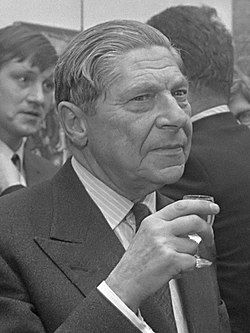Arthur Koestler Quote
Sympathy, conscience, disgust, despair, repentance, and atonement are for us repellent debauchery. To sit down and let oneself be hypnotized by one’s own navel, to turn up one’s eyes and humbly offer the back of one’s neck to Gletkin’s revolver—that is an easy solution. The greatest temptation for the like of us is: to renounce violence, to repent, to make peace with oneself. Most great revolutionaries fell before this temptation, from Spartacus to Danton and Dostoevsky; they are the classical form of betrayal of the cause. The temptations of God were always more dangerous for mankind than those of Satan. As long as chaos dominates the world, God is ananachronism; and every compromise with one’s own conscience is perfidy. When the accursed inner voice speaks to you, hold your hands over your ears. ... He felt for the bottle behind him and poured out an other glass. Rubashov noticed that the bottle was already half empty. You also could do with a little solace, he thought.The greatest criminals in history, Ivanov went on, are not of the type Nero and Fouché, but of the type Gandhi and Tolstoy. Gandhi’s inner voice has done more to prevent the liberation of India than the British guns. To sell oneself for thirty pieces of silver is an honest transaction; but to sell oneself to one’s own conscience is to abandon mankind. History is a priori amoral; it has no conscience. To want to conduct history according to the maxims of the Sunday school means to leave everything as it is.
Sympathy, conscience, disgust, despair, repentance, and atonement are for us repellent debauchery. To sit down and let oneself be hypnotized by one’s own navel, to turn up one’s eyes and humbly offer the back of one’s neck to Gletkin’s revolver—that is an easy solution. The greatest temptation for the like of us is: to renounce violence, to repent, to make peace with oneself. Most great revolutionaries fell before this temptation, from Spartacus to Danton and Dostoevsky; they are the classical form of betrayal of the cause. The temptations of God were always more dangerous for mankind than those of Satan. As long as chaos dominates the world, God is ananachronism; and every compromise with one’s own conscience is perfidy. When the accursed inner voice speaks to you, hold your hands over your ears. ... He felt for the bottle behind him and poured out an other glass. Rubashov noticed that the bottle was already half empty. You also could do with a little solace, he thought.The greatest criminals in history, Ivanov went on, are not of the type Nero and Fouché, but of the type Gandhi and Tolstoy. Gandhi’s inner voice has done more to prevent the liberation of India than the British guns. To sell oneself for thirty pieces of silver is an honest transaction; but to sell oneself to one’s own conscience is to abandon mankind. History is a priori amoral; it has no conscience. To want to conduct history according to the maxims of the Sunday school means to leave everything as it is.
Related Quotes
About Arthur Koestler
Having moved to Britain in 1940, Koestler published his novel Darkness at Noon, an anti-totalitarian work that gained him international fame. Over the next 43 years, Koestler espoused many political causes and wrote novels, memoirs, biographies, and numerous essays. In 1949, Koestler began secretly working with a British Cold War anti-communist propaganda department known as the Information Research Department (IRD), which would republish and distribute many of his works, and also fund his activities. In 1968, he was awarded the Sonning Prize "for [his] outstanding contribution to European culture". In 1972, he was made a Commander of the Order of the British Empire (CBE).
In 1976, Koestler was diagnosed with Parkinson's disease and in 1979 with terminal leukaemia. On 1 March 1983, Koestler and his wife Cynthia died of suicide together at their London home by swallowing lethal quantities of barbiturate-based Tuinal capsules.
